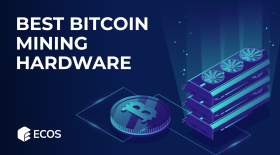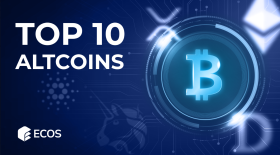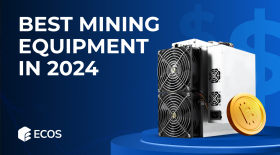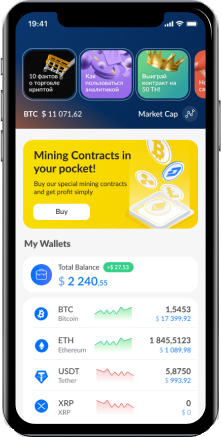What is Ethereum? Its functions, peculiarities, and goals
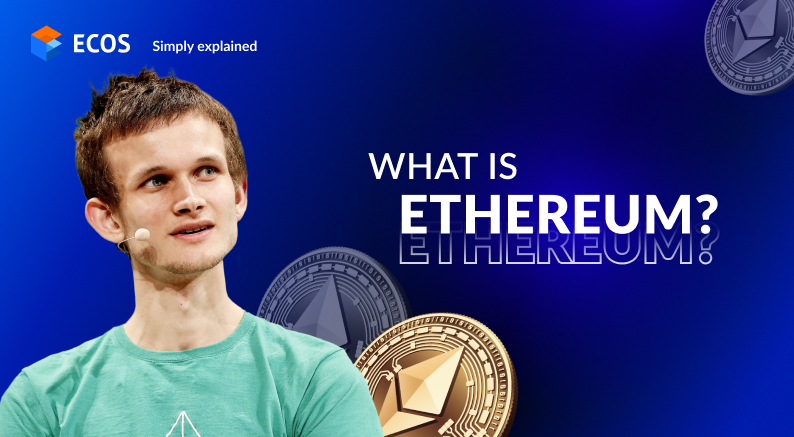
Of course, Ethereum was not the first. It came after Bitcoin was a crypto pioneer, but its creators managed to launch something that is totally different from the first coin and found its own way to success. And mainly this success is based on the fact that Ethereum was created not only as a means of payment or store of value. It is intended to provide the entire infrastructure for the DApp developers and that is why it is backed by real value, unlike Bitcoin. So how does Ethereum work, why is it so popular, and what is it generally? What is Ethereum and what is an Ethereum coin?
What is Ethereum?
To put it simply, Ethereum can be defined as a decentralized platform built on blockchain. A blockchain refers generally to a digital ledger that is distributed across the computer network storing encrypted blocks of data.
This means that any participant of the Ethereum network keeps an identical copy of this ledger, making all past transactions transparent. As a decentralized system, this network is not run and/or controlled by any centralized foundation. Instead of this, all of the holders of the distributed ledger can operate it.
Cryptographic technologies provide security and safety of transactions via blockchain. The users offer their computing power to create new blocks. This process is called “mining”. Mining involves sophisticated mathematical operations to verify each transaction in the blockchain. As a result, successful users obtain crypto tokens as a reward. Speaking of the Ethereum network, the participants can receive Ether (ETH), a native platform’s token.
Ether demonstrates the same functions as other cryptocurrencies and can be used as a unit of account. Crypto investors also keep a close eye on it as it goes up much faster than any other altcoin. But the key Ethereum network’s difference from Bitcoin is that Ethereum allows its users to build various apps from service programs to games that run on this blockchain.
Ken Fromm, the managing director of BuildETH, mentions that Ethereum’s “basic computational capability turns a store of value and medium of exchange into a decentralized global computing engine and openly verifiable data store.”
Are Ether and Ethereum the same?
These two words are often confused and used interchangeably even in serious texts and research. In fact, these are different terms that determine two related but not identical things. Ether is a cryptocurrency that is traded, exchanged, or used as a financial tool. Ethereum is a blockchain that empowers ETH while ETH fuels the entire Ethereum ecosystem. Both phenomena are interdependent in some way but their functions are not limited to each other.
Boaz Avital, the head of products at Anchorage Digital, notes that Ether can be used for various transactions both small and complex. And all these transactions are possible because of the Ethereum network performance.
Many users prefer the Ethereum blockchain to Google or Amazon’s servers for running apps or storing data because of its decentralized nature. This means that no one can control, change, or delete the data that is hosted there. Any data owner retains control and nobody can interfere in their activities by using management tools. Such relations of peers with no government seem very attractive for users of such services.
And smart contracts are one of the most interesting options that are often associated with Ethereum and Ether though they can be accommodated on other blockchain platforms. These are computer programs that can automatically perform transactions if certain conditions are met. No third parties are required for such transactions.
Ethereum or Bitcoin: which is better?
Bitcoin was the first and it faces both advantages and disadvantages of this position. Ethereum appeared much later and had a chance to take the predecessor’s experience into account making use of its successful options.
Bitcoin and Ether can be used as digital currency to buy and sell virtual and real products. This is the main function of any currency and these coins are not an exception. They are also used as a means of hoarding but that’s nearly all for Bitcoin. Ethereum offers much more and is backed by a set of services that support the real value of this blockchain.
When it comes to the speed of transactions, Ethereum is obviously faster. It takes around 10 minutes to create a new block on the Bitcoin network while you need only 12 seconds to validate a new block on the Ethereum. And we can expect that this time will even be reduced.
And another serious difference between these two coins is that the number of Bitcoins that can be potentially minted is limited while Ether is potentially unlimited. It is difficult to point out definitely if this fact is an advantage or disadvantage as it depends on numerous demands of a certain investor.
Advantages of Ethereum
As with any large serious project, Ethereum has its own advantages and disadvantages. We’ll examine them in detail though let’s start with advantages:
- Extended network. The size of the Ethereum network allows it to work with hundreds of nodes and millions of users. Its work is already proven to be rather stable and it continues to grow rapidly.
- Extended functionality. Ethereum enables its fans to utilize blockchain technologies for a variety of purposes, not only as a source of ETH mining.
- Permanent development. Such a large network has to innovate, deploying blockchain solutions to address industry problems. The developers offer new and new decentralized apps to satisfy the existing demand and predict future trends.
- No interlayers and third parties are involved. You don’t need anybody to prepare a contract for you or an intermediary to transfer money. You also don’t need to trust your counterpart though you avoid all risks associated with money deals.
Disadvantages of Ethereum
As with any technical solution, Ethereum also has its disadvantages, and to be fair, we cannot ignore them even if we like this solution generally. We would like to emphasize such aspects that may discourage some users:
- Increased transaction fees. The transaction fees increase as public interest in Ethereum has soared, and more people try their hand at DeFi. They are rocketing and make transactions within the network uncomfortable for many users. Such a situation is possible as the fee is covered by the transaction participants.
- Ether cryptocurrency is not inflation-resistant. There is no maximum supply of this altcoin. This means that it is inflationary by its nature. That is why it seems to be rather a means of speculative investments than a store of value.
- Difficulties for developers with the incorporation of new technologies. Some developers may experience difficulties with Ethereum because they have already gotten used to centralized operations.
What is the easiest way to buy ETH?
Often, you can come across the offer to buy or sell Ethereum. Is it possible? Of course, not. This is a common mistake of Ethereum newbies who don’t differentiate the blockchain and token confusing their names. But you can buy Ether instead. There are several quite accessible ways to obtain ETH via mining or participating in some events but actually, the fastest way is to buy it on the exchange. Just follow this simple instruction and you’ll quickly become an ETH owner:
- Buy ECOS portfolios. Many portfolios in ECOS consist of Ethereum. It’s the easiest way to invest in ETH!
- Decide on a crypto exchange. There are numerous platforms that offer various services associated with digital money. You can always buy any amount of ETH there. This token is commonly used along with BTC, and you will have no problems finding an exchange where this altcoin is traded. Don’t forget about fees be ready to pay for trading and/or withdrawal.
- Deposit money in the trading platform. If you are a newcomer and don’t have cryptocurrency yet, you’ll need to deposit cash, so it is necessary to look for an exchange that works with fiats as not all of them have such a service.
- Buy ETH. When you have enough funds in your account, you can buy ETH at any time now. Or buy BTC, or any other altcoin if you’ve changed your mind. Now you are an owner of these digital assets and can do anything you want with them: store, sell, exchange, transfer to another user. Don’t forget about the fees!
- Create a wallet. If you don’t want to spend your ETH just after the purchase, the platform is not the best place for storing it. Crypto exchanges suffer from hacker attacks from time to time and you can easily lose your money. To avoid the risks, you’d better transfer your funds from the exchange. Think about a safe digital wallet for storing ETH.
To buy or not to buy?
What is ETH? This is the world’s second-largest cryptocurrency. That is why the first question is to be “Should I buy crypto at all?” If your answer is “yes”, you have already positively answered the question in the headline.
Ethereum is rapidly developed, more and people utilize its distributed apps and they need more ETH. It seems to be a good investment but mind the possible risks of the volatile digital market. Consider all the pros and cons before entering this market and decide which sum would be not crucial for your welfare. Don’t invest more than you can easily lose.
To sum it up
Ethereum is an interesting phenomenon in the crypto world. It opened a new chapter in the specific history of blockchain and made blockchain close to the public. A variety of innovative applications in numerous fields from finance to advertising, games and supply chain management, and everything in between attracting new users to this network.
How does Ethereum work in the crypto world? Ethereum and Ether stand apart from the short-lived projects that are born and die every day online. They have the potential not only to meet their users’ needs but to boost further development of the blockchain and the crypto community.
If you want to invest in Ethereum, pay attention to ECOS portfolios: Elon Musk Index, NFT Index, Blockchain Infrastructure Index and others!




